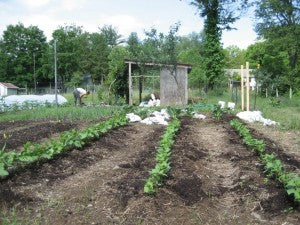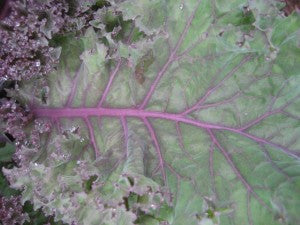 When I was a CSA farmer, I loved introducing my members to varieties they had never seen or tasted before, but it was always a risk to try something new. Would that variety live up to the expectation I was attracted to in the first place? When something didn't live up to my expectation, I always felt like a failure. It's an experience all growers can relate to, whether gardener to farmer. New varieties are exciting, but also unknown. If something fails one season, it's hard to know exactly why, and whether that variety is worth investing in again.
When I was a CSA farmer, I loved introducing my members to varieties they had never seen or tasted before, but it was always a risk to try something new. Would that variety live up to the expectation I was attracted to in the first place? When something didn't live up to my expectation, I always felt like a failure. It's an experience all growers can relate to, whether gardener to farmer. New varieties are exciting, but also unknown. If something fails one season, it's hard to know exactly why, and whether that variety is worth investing in again.
As trials manager at the Hudson Valley Seed Library, I am able to focus simply on what works and what doesn't. Instead of being the exception, the testing and comparing is the rule, without worrying about failure. In the trials there are no CSA members or farm market customers to please, only data to collect. If a crop fails in a season, I consider that valuable data worth recording.
As a seed company, our trials serve as research and development for the products we offer-seeds. But seeds aren't a typical product, they are living potential that has to be cared for and tended to. Our mission is to offer high quality, dependable, open-pollinated varieties for the organic grower. We can't possibly know if something is dependable and valuable if we don't grow it! Even further, through trials we are able to learn what methods and seasons best suit the varieties we offer, allowing us to educate our customers on how to care for and tend to their garden plants. Trials also serve as an educational tool for us that informs what we grow on our seed farm.
Planning a trial
Planning trials is a continuous process. The data we compile in a season influences the information we seek in another. There are a number of factors we use to create a trial, such as customer feedback, newly available varieties, newly discovered old varieties, changing weather patterns, seed availability, and market trends, just to name a few. On top of all this, we want to offer open-pollinated varieties that perform well in our region under organic techniques.
In addition to testing varieties in trials, we also test technique. We constantly strive to find reliable methods that are accessible to our customers. We experiment with everything from season extension to edible landscaping to flower arranging.
We create trials for various reasons. The bulk of the space in our trial garden is dedicated to new varieties we are considering adding to our catalog, though we also plant varieties that we currently offer in order to monitor their quality and performance.
Some trials are simply a "grow-out." Grow-outs are a planting of a single variety which we tend, harvest, photograph and taste. The only data we collect is on that single variety and what value it has on its own.
We also perform more in depth variety trials, where we grow several varieties of the same crop and compare them to each other. For example, this year we performed a kale trial that included 6 distinct varieties, one of which was Lacinato Kale, our "control." A control is something we have a lot of experience growing over several seasons. It acts as something well-known and familiar to compare the new varieties to. In order to make any real comparisons, a control is key. Say the year is so-so, and the control performs poorly. If a variety performs better than our control, then it might have certain strengths we value, whereas, another variety that performs worse than the control has weaknesses we need to consider. Without a control, the best performing variety might be seen as weak in a so-so year; valuable variety could be dismissed because there was nothing to compare it to. On the other hand, a so-so variety might not show its weaknesses in a good year, unless there is something else to compare it to.
In addition to growing our own seed, we also source seed from other companies and growers. Because of this, we also conduct seed source trials. These trials are conducted much like the variety trials, except we grow one variety that comes from multiple sources. This allows us monitor the quality of the seed we offer compared to other available sources, from vigor, to purity, to the integrity of the variety.
The results from each of these different trials also influences what we grow on our seed farm, especially if we think something needs significant improvement, or if we find something valuable we want to offer to our customers that isn't readily available elsewhere. Most importantly, trialling helps us identify what selections we need to make to adapt varieties to our region.
2013 Trial Highlights
This year, we planted over 200 varieties in our trials! A lot of the information we gathered will be worked into our catalog, but here are some specific highlights from the season.
Peas please! We grew every pea in our catalog, and then some! We found that each variety in our catalog had a place, depending on the needs of the grower. Green Arrow shelling pea and Sugar Daddy snap pea were high-yielding, yet compact, while the taller, standard variety Sugar Snap was a stand out all around in terms of yield and flavor. Look out for Tall Telephone shelling pea, a staff favorite, available in 2014. It had an incredible bounty of delicious and tender green peas. We will also be offering Swiss Giant snow pea, a gorgeous plant that yielded giant, crisp, sweet now peas. It won our hearts over Mammoth Melting.
Back to black. Black tomatoes are usually incredibly delicious, but also cave under disease pressure first in the season. We were seeking the most reliable variety in terms of yield, flavor, and vigor. The clear stand out this year was Paul Robeson, which will be available in 2014. The color, more like a brown-rust than a purpley-black, is suberb and the flavor is complex and meaty. This year, the Paul Robeson plants stayed green the longest, and the fruits had the least splitting and spotting. This is definitely a trial we will continue to repeat for several years!
Baby greens of all sorts. We like to check in with our mixes from time to time. This year, we planted 4 successions of Ultimate Salad Bowl, 3 new salad mix formulas to compare the current mix to, as well as single plantings of all our greens and lettuces meant for cutting as a baby leaf. The results were not what I expected! I was ready to re-formulate USB, but after seeing how it performed in 3 seasons it won me over, as did some of the new formulas! Look forward to more seasonal salad mixes in 2014.
We love to hear from you! If you have something you want us to trial, are interested in learning more about conducting your own variety trials, or have feedback for us, let us know! Send an email to mail@seedlibrary.org.







